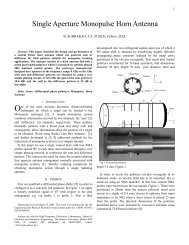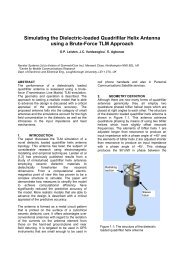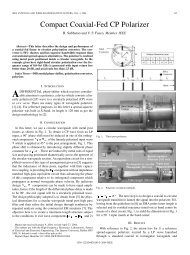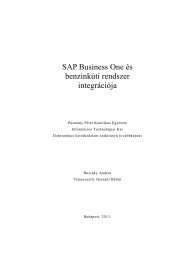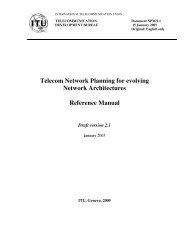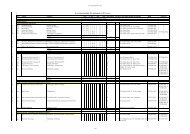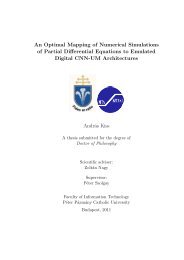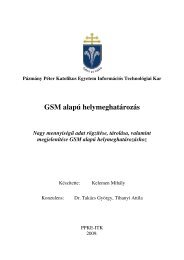- Page 1:
The EXPERT’s VOIce ® in Java tm
- Page 4 and 5:
Beginning Java EE 6 Platform with G
- Page 6 and 7:
Contents at a Glance■Foreword ...
- Page 8 and 9:
■ CONTENTSSummary ...............
- Page 10 and 11:
■ CONTENTSBulk Update ...........
- Page 12 and 13:
■ CONTENTSStateful . ............
- Page 14 and 15:
■ CONTENTSScripting Elements ....
- Page 16 and 17:
■ CONTENTSMDB Model .............
- Page 18 and 19:
■ CONTENTSFrom the Web to Web Ser
- Page 20 and 21:
About the Author■ Antonio Goncalv
- Page 22 and 23:
AcknowledgmentsWriting a book about
- Page 24 and 25:
■ PREFACECONTENTSChapter 1 briefl
- Page 27 and 28:
C H A P T E R 1■ ■ ■Java EE 6
- Page 29 and 30:
CHAPTER 1 ■ JAVA EE 6 AT A GLANCE
- Page 31 and 32:
CHAPTER 1 ■ JAVA EE 6 AT A GLANCE
- Page 33 and 34:
CHAPTER 1 ■ JAVA EE 6 AT A GLANCE
- Page 35 and 36:
CHAPTER 1 ■ JAVA EE 6 AT A GLANCE
- Page 37 and 38:
CHAPTER 1 ■ JAVA EE 6 AT A GLANCE
- Page 39 and 40:
CHAPTER 1 ■ JAVA EE 6 AT A GLANCE
- Page 41 and 42:
CHAPTER 1 ■ JAVA EE 6 AT A GLANCE
- Page 43 and 44:
CHAPTER 1 ■ JAVA EE 6 AT A GLANCE
- Page 45 and 46:
CHAPTER 1 ■ JAVA EE 6 AT A GLANCE
- Page 47 and 48:
CHAPTER 1 ■ JAVA EE 6 AT A GLANCE
- Page 49 and 50:
CHAPTER 1 ■ JAVA EE 6 AT A GLANCE
- Page 51 and 52:
CHAPTER 1 ■ JAVA EE 6 AT A GLANCE
- Page 53 and 54:
CHAPTER 1 ■ JAVA EE 6 AT A GLANCE
- Page 55 and 56:
CHAPTER 1 ■ JAVA EE 6 AT A GLANCE
- Page 57 and 58:
CHAPTER 1 ■ JAVA EE 6 AT A GLANCE
- Page 59 and 60:
CHAPTER 1 ■ JAVA EE 6 AT A GLANCE
- Page 61 and 62:
CHAPTER 1 ■ JAVA EE 6 AT A GLANCE
- Page 63 and 64:
CHAPTER 1 ■ JAVA EE 6 AT A GLANCE
- Page 65 and 66:
CHAPTER 1 ■ JAVA EE 6 AT A GLANCE
- Page 67:
CHAPTER 1 ■ JAVA EE 6 AT A GLANCE
- Page 70 and 71:
CHAPTER 2 ■ JAVA PERSISTENCEJPA S
- Page 72 and 73:
CHAPTER 2 ■ JAVA PERSISTENCEEclip
- Page 74 and 75:
CHAPTER 2 ■ JAVA PERSISTENCEusing
- Page 76 and 77:
CHAPTER 2 ■ JAVA PERSISTENCEFigur
- Page 78 and 79:
CHAPTER 2 ■ JAVA PERSISTENCENote
- Page 80 and 81:
CHAPTER 2 ■ JAVA PERSISTENCE■ N
- Page 82 and 83:
CHAPTER 2 ■ JAVA PERSISTENCERunni
- Page 84 and 85:
CHAPTER 2 ■ JAVA PERSISTENCE@Befo
- Page 86 and 87:
CHAPTER 2 ■ JAVA PERSISTENCERunni
- Page 88 and 89:
CHAPTER 3 ■ OBJECT-RELATIONAL MAP
- Page 90 and 91:
CHAPTER 3 ■ OBJECT-RELATIONAL MAP
- Page 92 and 93:
CHAPTER 3 ■ OBJECT-RELATIONAL MAP
- Page 94 and 95:
CHAPTER 3 ■ OBJECT-RELATIONAL MAP
- Page 96 and 97:
CHAPTER 3 ■ OBJECT-RELATIONAL MAP
- Page 98 and 99:
CHAPTER 3 ■ OBJECT-RELATIONAL MAP
- Page 100 and 101:
CHAPTER 3 ■ OBJECT-RELATIONAL MAP
- Page 102 and 103:
CHAPTER 3 ■ OBJECT-RELATIONAL MAP
- Page 104 and 105:
CHAPTER 3 ■ OBJECT-RELATIONAL MAP
- Page 106 and 107:
CHAPTER 3 ■ OBJECT-RELATIONAL MAP
- Page 108 and 109:
CHAPTER 3 ■ OBJECT-RELATIONAL MAP
- Page 110 and 111:
CHAPTER 3 ■ OBJECT-RELATIONAL MAP
- Page 112 and 113:
CHAPTER 3 ■ OBJECT-RELATIONAL MAP
- Page 114 and 115:
CHAPTER 3 ■ OBJECT-RELATIONAL MAP
- Page 116 and 117:
CHAPTER 3 ■ OBJECT-RELATIONAL MAP
- Page 118 and 119:
CHAPTER 3 ■ OBJECT-RELATIONAL MAP
- Page 120 and 121:
CHAPTER 3 ■ OBJECT-RELATIONAL MAP
- Page 122 and 123:
CHAPTER 3 ■ OBJECT-RELATIONAL MAP
- Page 124 and 125:
CHAPTER 3 ■ OBJECT-RELATIONAL MAP
- Page 126 and 127:
CHAPTER 3 ■ OBJECT-RELATIONAL MAP
- Page 128 and 129:
CHAPTER 3 ■ OBJECT-RELATIONAL MAP
- Page 130 and 131:
CHAPTER 3 ■ OBJECT-RELATIONAL MAP
- Page 132 and 133:
CHAPTER 3 ■ OBJECT-RELATIONAL MAP
- Page 134 and 135:
CHAPTER 3 ■ OBJECT-RELATIONAL MAP
- Page 136 and 137:
CHAPTER 3 ■ OBJECT-RELATIONAL MAP
- Page 138 and 139:
CHAPTER 3 ■ OBJECT-RELATIONAL MAP
- Page 140 and 141:
CHAPTER 3 ■ OBJECT-RELATIONAL MAP
- Page 142 and 143:
CHAPTER 3 ■ OBJECT-RELATIONAL MAP
- Page 144 and 145:
CHAPTER 3 ■ OBJECT-RELATIONAL MAP
- Page 146 and 147:
CHAPTER 3 ■ OBJECT-RELATIONAL MAP
- Page 149 and 150:
C H A P T E R 4■ ■ ■Managing
- Page 151 and 152:
CHAPTER 4 ■ MANAGING PERSISTENT O
- Page 153 and 154:
CHAPTER 4 ■ MANAGING PERSISTENT O
- Page 155 and 156:
CHAPTER 4 ■ MANAGING PERSISTENT O
- Page 157 and 158:
CHAPTER 4 ■ MANAGING PERSISTENT O
- Page 159 and 160:
CHAPTER 4 ■ MANAGING PERSISTENT O
- Page 161 and 162:
CHAPTER 4 ■ MANAGING PERSISTENT O
- Page 163 and 164:
CHAPTER 4 ■ MANAGING PERSISTENT O
- Page 165 and 166:
CHAPTER 4 ■ MANAGING PERSISTENT O
- Page 167 and 168:
CHAPTER 4 ■ MANAGING PERSISTENT O
- Page 169 and 170:
CHAPTER 4 ■ MANAGING PERSISTENT O
- Page 171 and 172:
CHAPTER 4 ■ MANAGING PERSISTENT O
- Page 173 and 174:
CHAPTER 4 ■ MANAGING PERSISTENT O
- Page 175 and 176:
CHAPTER 4 ■ MANAGING PERSISTENT O
- Page 177 and 178:
CHAPTER 4 ■ MANAGING PERSISTENT O
- Page 179 and 180:
CHAPTER 4 ■ MANAGING PERSISTENT O
- Page 181 and 182:
CHAPTER 4 ■ MANAGING PERSISTENT O
- Page 183 and 184:
CHAPTER 4 ■ MANAGING PERSISTENT O
- Page 185 and 186:
CHAPTER 4 ■ MANAGING PERSISTENT O
- Page 187 and 188:
CHAPTER 4 ■ MANAGING PERSISTENT O
- Page 189 and 190:
CHAPTER 4 ■ MANAGING PERSISTENT O
- Page 191 and 192:
CHAPTER 4 ■ MANAGING PERSISTENT O
- Page 193 and 194:
C H A P T E R 5■ ■ ■Callbacks
- Page 195 and 196:
CHAPTER 5 ■ CALLBACKS AND LISTENE
- Page 197 and 198:
CHAPTER 5 ■ CALLBACKS AND LISTENE
- Page 199 and 200:
CHAPTER 5 ■ CALLBACKS AND LISTENE
- Page 201 and 202: CHAPTER 5 ■ CALLBACKS AND LISTENE
- Page 203: CHAPTER 5 ■ CALLBACKS AND LISTENE
- Page 206 and 207: CHAPTER 6 ■ ENTERPRISE JAVA BEANS
- Page 208 and 209: CHAPTER 6 ■ ENTERPRISE JAVA BEANS
- Page 210 and 211: CHAPTER 6 ■ ENTERPRISE JAVA BEANS
- Page 212 and 213: CHAPTER 6 ■ ENTERPRISE JAVA BEANS
- Page 214 and 215: CHAPTER 6 ■ ENTERPRISE JAVA BEANS
- Page 216 and 217: CHAPTER 6 ■ ENTERPRISE JAVA BEANS
- Page 218 and 219: CHAPTER 6 ■ ENTERPRISE JAVA BEANS
- Page 220 and 221: CHAPTER 6 ■ ENTERPRISE JAVA BEANS
- Page 222 and 223: CHAPTER 6 ■ ENTERPRISE JAVA BEANS
- Page 224 and 225: CHAPTER 6 ■ ENTERPRISE JAVA BEANS
- Page 227 and 228: C H A P T E R 7■ ■ ■Session B
- Page 229 and 230: CHAPTER 7 ■ SESSION BEANS AND THE
- Page 231 and 232: CHAPTER 7 ■ SESSION BEANS AND THE
- Page 233 and 234: CHAPTER 7 ■ SESSION BEANS AND THE
- Page 235 and 236: CHAPTER 7 ■ SESSION BEANS AND THE
- Page 237 and 238: CHAPTER 7 ■ SESSION BEANS AND THE
- Page 239 and 240: CHAPTER 7 ■ SESSION BEANS AND THE
- Page 241 and 242: CHAPTER 7 ■ SESSION BEANS AND THE
- Page 243 and 244: CHAPTER 7 ■ SESSION BEANS AND THE
- Page 245 and 246: CHAPTER 7 ■ SESSION BEANS AND THE
- Page 247 and 248: CHAPTER 7 ■ SESSION BEANS AND THE
- Page 249 and 250: CHAPTER 7 ■ SESSION BEANS AND THE
- Page 251: CHAPTER 7 ■ SESSION BEANS AND THE
- Page 255 and 256: CHAPTER 7 ■ SESSION BEANS AND THE
- Page 257 and 258: CHAPTER 7 ■ SESSION BEANS AND THE
- Page 259 and 260: CHAPTER 7 ■ SESSION BEANS AND THE
- Page 261 and 262: CHAPTER 7 ■ SESSION BEANS AND THE
- Page 263 and 264: C H A P T E R 8■ ■ ■Callbacks
- Page 265 and 266: CHAPTER 8 ■ CALLBACKS AND INTERCE
- Page 267 and 268: CHAPTER 8 ■ CALLBACKS AND INTERCE
- Page 269 and 270: CHAPTER 8 ■ CALLBACKS AND INTERCE
- Page 271 and 272: CHAPTER 8 ■ CALLBACKS AND INTERCE
- Page 273 and 274: CHAPTER 8 ■ CALLBACKS AND INTERCE
- Page 275 and 276: CHAPTER 8 ■ CALLBACKS AND INTERCE
- Page 277 and 278: CHAPTER 8 ■ CALLBACKS AND INTERCE
- Page 279 and 280: C H A P T E R 9■ ■ ■Transacti
- Page 281 and 282: CHAPTER 9 ■ TRANSACTIONS AND SECU
- Page 283 and 284: CHAPTER 9 ■ TRANSACTIONS AND SECU
- Page 285 and 286: CHAPTER 9 ■ TRANSACTIONS AND SECU
- Page 287 and 288: CHAPTER 9 ■ TRANSACTIONS AND SECU
- Page 289 and 290: CHAPTER 9 ■ TRANSACTIONS AND SECU
- Page 291 and 292: CHAPTER 9 ■ TRANSACTIONS AND SECU
- Page 293 and 294: CHAPTER 9 ■ TRANSACTIONS AND SECU
- Page 295 and 296: CHAPTER 9 ■ TRANSACTIONS AND SECU
- Page 297 and 298: CHAPTER 9 ■ TRANSACTIONS AND SECU
- Page 299 and 300: CHAPTER 9 ■ TRANSACTIONS AND SECU
- Page 301: CHAPTER 9 ■ TRANSACTIONS AND SECU
- Page 304 and 305:
CHAPTER 10 ■ JAVASERVER FACESUnde
- Page 306 and 307:
CHAPTER 10 ■ JAVASERVER FACESList
- Page 308 and 309:
CHAPTER 10 ■ JAVASERVER FACESList
- Page 310 and 311:
CHAPTER 10 ■ JAVASERVER FACESJSR
- Page 312 and 313:
CHAPTER 10 ■ JAVASERVER FACESWrit
- Page 314 and 315:
CHAPTER 10 ■ JAVASERVER FACESpubl
- Page 316 and 317:
CHAPTER 10 ■ JAVASERVER FACES•
- Page 318 and 319:
CHAPTER 10 ■ JAVASERVER FACESAPre
- Page 320 and 321:
CHAPTER 10 ■ JAVASERVER FACESorg.
- Page 323 and 324:
C H A P T E R 11■ ■ ■Pages an
- Page 325 and 326:
CHAPTER 11 ■ PAGES AND COMPONENTS
- Page 327 and 328:
CHAPTER 11 ■ PAGES AND COMPONENTS
- Page 329 and 330:
CHAPTER 11 ■ PAGES AND COMPONENTS
- Page 331 and 332:
CHAPTER 11 ■ PAGES AND COMPONENTS
- Page 333 and 334:
CHAPTER 11 ■ PAGES AND COMPONENTS
- Page 335 and 336:
CHAPTER 11 ■ PAGES AND COMPONENTS
- Page 337 and 338:
CHAPTER 11 ■ PAGES AND COMPONENTS
- Page 339 and 340:
CHAPTER 11 ■ PAGES AND COMPONENTS
- Page 341 and 342:
CHAPTER 11 ■ PAGES AND COMPONENTS
- Page 343 and 344:
CHAPTER 11 ■ PAGES AND COMPONENTS
- Page 345 and 346:
CHAPTER 11 ■ PAGES AND COMPONENTS
- Page 347 and 348:
CHAPTER 11 ■ PAGES AND COMPONENTS
- Page 349 and 350:
CHAPTER 11 ■ PAGES AND COMPONENTS
- Page 351 and 352:
CHAPTER 11 ■ PAGES AND COMPONENTS
- Page 353 and 354:
CHAPTER 11 ■ PAGES AND COMPONENTS
- Page 355 and 356:
CHAPTER 11 ■ PAGES AND COMPONENTS
- Page 357 and 358:
CHAPTER 11 ■ PAGES AND COMPONENTS
- Page 359 and 360:
CHAPTER 11 ■ PAGES AND COMPONENTS
- Page 361 and 362:
CHAPTER 11 ■ PAGES AND COMPONENTS
- Page 363 and 364:
CHAPTER 11 ■ PAGES AND COMPONENTS
- Page 365 and 366:
CHAPTER 11 ■ PAGES AND COMPONENTS
- Page 367 and 368:
CHAPTER 11 ■ PAGES AND COMPONENTS
- Page 369:
CHAPTER 11 ■ PAGES AND COMPONENTS
- Page 372 and 373:
CHAPTER 12 ■ PROCESSING AND NAVIG
- Page 374 and 375:
CHAPTER 12 ■ PROCESSING AND NAVIG
- Page 376 and 377:
CHAPTER 12 ■ PROCESSING AND NAVIG
- Page 378 and 379:
CHAPTER 12 ■ PROCESSING AND NAVIG
- Page 380 and 381:
CHAPTER 12 ■ PROCESSING AND NAVIG
- Page 382 and 383:
CHAPTER 12 ■ PROCESSING AND NAVIG
- Page 384 and 385:
CHAPTER 12 ■ PROCESSING AND NAVIG
- Page 386 and 387:
CHAPTER 12 ■ PROCESSING AND NAVIG
- Page 388 and 389:
CHAPTER 12 ■ PROCESSING AND NAVIG
- Page 390 and 391:
CHAPTER 12 ■ PROCESSING AND NAVIG
- Page 392 and 393:
CHAPTER 12 ■ PROCESSING AND NAVIG
- Page 394 and 395:
CHAPTER 12 ■ PROCESSING AND NAVIG
- Page 396 and 397:
CHAPTER 12 ■ PROCESSING AND NAVIG
- Page 398 and 399:
CHAPTER 12 ■ PROCESSING AND NAVIG
- Page 400 and 401:
CHAPTER 12 ■ PROCESSING AND NAVIG
- Page 402 and 403:
CHAPTER 12 ■ PROCESSING AND NAVIG
- Page 404 and 405:
CHAPTER 13 ■ SENDING MESSAGESFigu
- Page 406 and 407:
CHAPTER 13 ■ SENDING MESSAGESmeth
- Page 408 and 409:
CHAPTER 13 ■ SENDING MESSAGESJava
- Page 410 and 411:
CHAPTER 13 ■ SENDING MESSAGESqueu
- Page 412 and 413:
CHAPTER 13 ■ SENDING MESSAGESAdmi
- Page 414 and 415:
CHAPTER 13 ■ SENDING MESSAGESTabl
- Page 416 and 417:
CHAPTER 13 ■ SENDING MESSAGESA se
- Page 418 and 419:
CHAPTER 13 ■ SENDING MESSAGESProp
- Page 420 and 421:
CHAPTER 13 ■ SENDING MESSAGESMess
- Page 422 and 423:
CHAPTER 13 ■ SENDING MESSAGESlist
- Page 424 and 425:
CHAPTER 13 ■ SENDING MESSAGESSett
- Page 426 and 427:
CHAPTER 13 ■ SENDING MESSAGESAt t
- Page 428 and 429:
CHAPTER 13 ■ SENDING MESSAGES@Mes
- Page 430 and 431:
CHAPTER 13 ■ SENDING MESSAGESDepe
- Page 432 and 433:
CHAPTER 13 ■ SENDING MESSAGESTabl
- Page 434 and 435:
CHAPTER 13 ■ SENDING MESSAGESTabl
- Page 436 and 437:
CHAPTER 13 ■ SENDING MESSAGESthe
- Page 438 and 439:
CHAPTER 13 ■ SENDING MESSAGES3.0.
- Page 440 and 441:
CHAPTER 13 ■ SENDING MESSAGESRunn
- Page 442 and 443:
CHAPTER 14 ■ SOAP WEB SERVICESFig
- Page 444 and 445:
CHAPTER 14 ■ SOAP WEB SERVICESTra
- Page 446 and 447:
CHAPTER 14 ■ SOAP WEB SERVICESpru
- Page 448 and 449:
CHAPTER 14 ■ SOAP WEB SERVICESJav
- Page 450 and 451:
CHAPTER 14 ■ SOAP WEB SERVICESFig
- Page 452 and 453:
CHAPTER 14 ■ SOAP WEB SERVICES@Xm
- Page 454 and 455:
CHAPTER 14 ■ SOAP WEB SERVICESWhe
- Page 456 and 457:
CHAPTER 14 ■ SOAP WEB SERVICESThe
- Page 458 and 459:
CHAPTER 14 ■ SOAP WEB SERVICESJav
- Page 460 and 461:
CHAPTER 14 ■ SOAP WEB SERVICES•
- Page 462 and 463:
CHAPTER 14 ■ SOAP WEB SERVICES@We
- Page 464 and 465:
CHAPTER 14 ■ SOAP WEB SERVICESThe
- Page 466 and 467:
CHAPTER 14 ■ SOAP WEB SERVICESWeb
- Page 468 and 469:
CHAPTER 14 ■ SOAP WEB SERVICESPut
- Page 470 and 471:
CHAPTER 14 ■ SOAP WEB SERVICES2.2
- Page 472 and 473:
CHAPTER 14 ■ SOAP WEB SERVICESFig
- Page 474 and 475:
CHAPTER 14 ■ SOAP WEB SERVICES448
- Page 476 and 477:
CHAPTER 14 ■ SOAP WEB SERVICESapp
- Page 478 and 479:
CHAPTER 15 ■ RESTFUL WEB SERVICES
- Page 480 and 481:
CHAPTER 15 ■ RESTFUL WEB SERVICES
- Page 482 and 483:
CHAPTER 15 ■ RESTFUL WEB SERVICES
- Page 484 and 485:
CHAPTER 15 ■ RESTFUL WEB SERVICES
- Page 486 and 487:
CHAPTER 15 ■ RESTFUL WEB SERVICES
- Page 488 and 489:
CHAPTER 15 ■ RESTFUL WEB SERVICES
- Page 490 and 491:
CHAPTER 15 ■ RESTFUL WEB SERVICES
- Page 492 and 493:
CHAPTER 15 ■ RESTFUL WEB SERVICES
- Page 494 and 495:
CHAPTER 15 ■ RESTFUL WEB SERVICES
- Page 496 and 497:
CHAPTER 15 ■ RESTFUL WEB SERVICES
- Page 498 and 499:
CHAPTER 15 ■ RESTFUL WEB SERVICES
- Page 500 and 501:
CHAPTER 15 ■ RESTFUL WEB SERVICES
- Page 502 and 503:
CHAPTER 15 ■ RESTFUL WEB SERVICES
- Page 504 and 505:
CHAPTER 15 ■ RESTFUL WEB SERVICES
- Page 506 and 507:
CHAPTER 15 ■ RESTFUL WEB SERVICES
- Page 508 and 509:
CHAPTER 15 ■ RESTFUL WEB SERVICES
- Page 510 and 511:
CHAPTER 15 ■ RESTFUL WEB SERVICES
- Page 512 and 513:
■ INDEXApache Maven. See Mavenapp
- Page 514 and 515:
■ INDEXCD-BookStore application (
- Page 516 and 517:
■ INDEXDerby, 31-32installing, 32
- Page 518 and 519:
■ INDEXexpression language (EL),
- Page 520 and 521:
■ INDEX tag, 328, 356 tag (JSF),
- Page 522 and 523:
■ INDEXJava Archive (jar) files,
- Page 524 and 525:
■ INDEXjavax.persistence.EntityMa
- Page 526 and 527:
■ INDEXMessageConsumer, 394@Messa
- Page 528 and 529:
■ INDEX tag, 176persistent class,
- Page 530 and 531:
■ INDEX■ Sscalar expressions in
- Page 532 and 533:
■ INDEXtimer service, 230-35autom
- Page 534:
■ INDEXXHTML 1.0 Transitional, 30


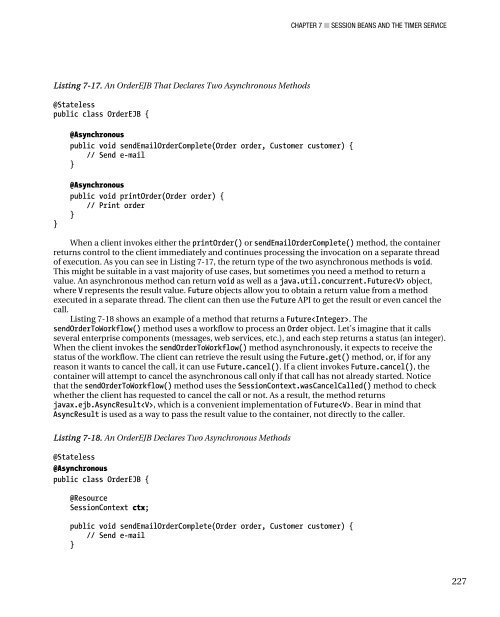

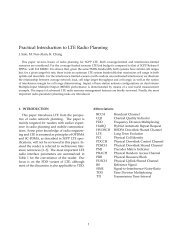
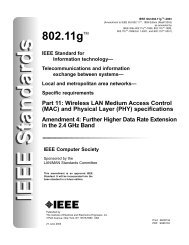
![optika tervezés [Kompatibilitási mód] - Ez itt...](https://img.yumpu.com/45881475/1/190x146/optika-tervezacs-kompatibilitasi-mad-ez-itt.jpg?quality=85)
